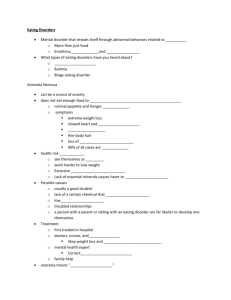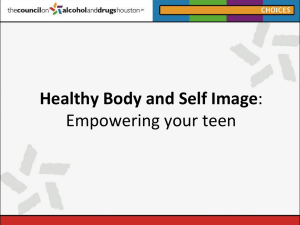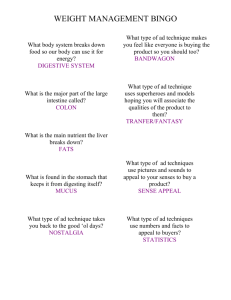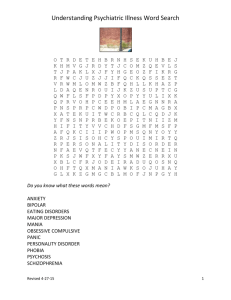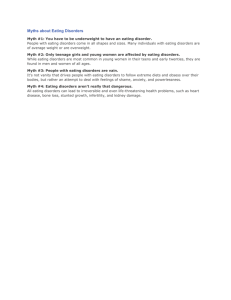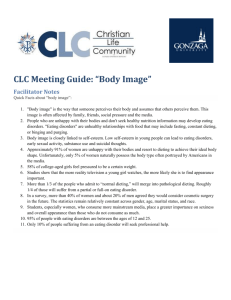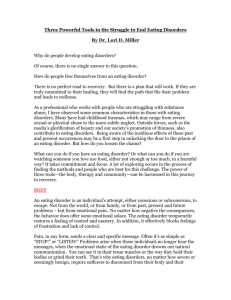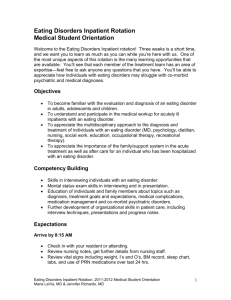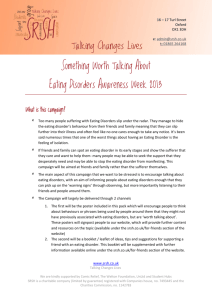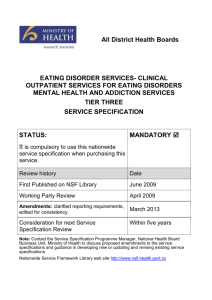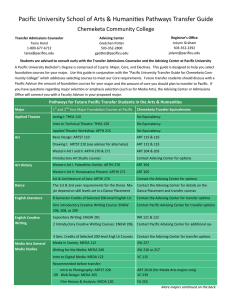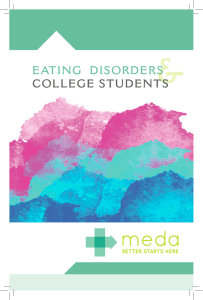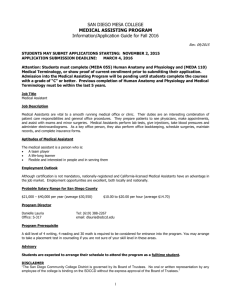Thinking Outside the Body: Empowering Yourself, Your Clients and
advertisement
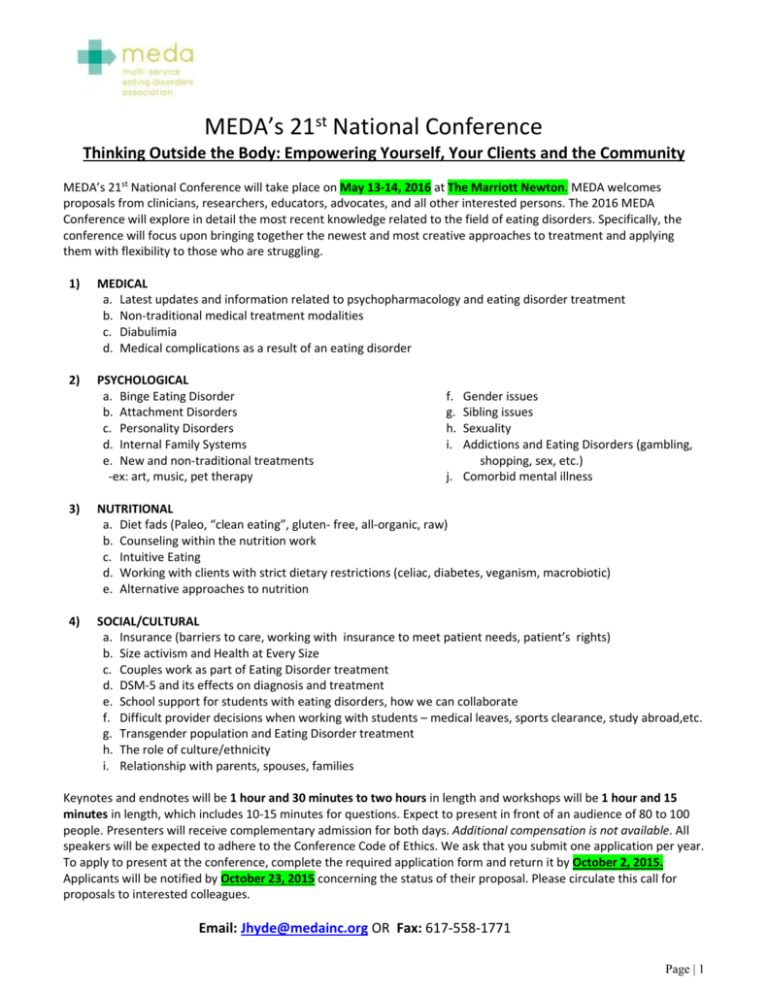
MEDA’s 21st National Conference Thinking Outside the Body: Empowering Yourself, Your Clients and the Community MEDA’s 21st National Conference will take place on May 13-14, 2016 at The Marriott Newton. MEDA welcomes proposals from clinicians, researchers, educators, advocates, and all other interested persons. The 2016 MEDA Conference will explore in detail the most recent knowledge related to the field of eating disorders. Specifically, the conference will focus upon bringing together the newest and most creative approaches to treatment and applying them with flexibility to those who are struggling. 1) MEDICAL a. Latest updates and information related to psychopharmacology and eating disorder treatment b. Non-traditional medical treatment modalities c. Diabulimia d. Medical complications as a result of an eating disorder 2) PSYCHOLOGICAL a. Binge Eating Disorder b. Attachment Disorders c. Personality Disorders d. Internal Family Systems e. New and non-traditional treatments -ex: art, music, pet therapy f. g. h. i. Gender issues Sibling issues Sexuality Addictions and Eating Disorders (gambling, shopping, sex, etc.) j. Comorbid mental illness 3) NUTRITIONAL a. Diet fads (Paleo, “clean eating”, gluten- free, all-organic, raw) b. Counseling within the nutrition work c. Intuitive Eating d. Working with clients with strict dietary restrictions (celiac, diabetes, veganism, macrobiotic) e. Alternative approaches to nutrition 4) SOCIAL/CULTURAL a. Insurance (barriers to care, working with insurance to meet patient needs, patient’s rights) b. Size activism and Health at Every Size c. Couples work as part of Eating Disorder treatment d. DSM-5 and its effects on diagnosis and treatment e. School support for students with eating disorders, how we can collaborate f. Difficult provider decisions when working with students – medical leaves, sports clearance, study abroad,etc. g. Transgender population and Eating Disorder treatment h. The role of culture/ethnicity i. Relationship with parents, spouses, families Keynotes and endnotes will be 1 hour and 30 minutes to two hours in length and workshops will be 1 hour and 15 minutes in length, which includes 10-15 minutes for questions. Expect to present in front of an audience of 80 to 100 people. Presenters will receive complementary admission for both days. Additional compensation is not available. All speakers will be expected to adhere to the Conference Code of Ethics. We ask that you submit one application per year. To apply to present at the conference, complete the required application form and return it by October 2, 2015. Applicants will be notified by October 23, 2015 concerning the status of their proposal. Please circulate this call for proposals to interested colleagues. Email: Jhyde@medainc.org OR Fax: 617-558-1771 Page | 1 Presenter Application 1.) Name: 2.) Credentials: 3.) License #: 4.) State(s) licensed: 5.) Mailing Address: 6.) Phone: ( ) 7.) Email Address: 8.) Current Position/Title: 9.) Relevant Experience/Qualifications (3-5 sentences) 10.) Bio Sketch (as you would like to appear in Conference Program) 11.) Title of workshop 12.) Description of workshop (3-5 sentences) 13.) Target Audience ☐ Academic ☐ Clinical ☐ General 14.) Suggestion Line (i.e. “Great for new clinicians”) Page | 2 15.) Teaching method(s) specific to this workshop (please check all that apply): ☐ Lecture ☐ Powerpoint ☐ Small Groups ☐ Case Presentation ☐ Interactive ☐ Discussion ☐ Other _____________ 16.) At least 3 OBJECTIVES/anticipated outcomes of presentation (must include specific measurable actions that learners will achieve as a result of attending the session) 1. 2. 3. 17.) Audiovisual Needs: (note: our AV budget is limited. We will try to work with you, but think about what you will really need for your workshop!)) ☐ LCD Projector ☐ Laptop ☐ White Board ☐ Microphone ☐ Audio ☐ Other _____________ 18.) Have you presented this workshop before? ☐ No ☐ Yes If yes, where? 19.) Bibliography (please list 3-5 references (books, articles, etc.) used to prepare presentation 1. 2. 3. 4. 5. 20.) Please include the following with your application: ☐ The most recent copy of your resume or CV ☐ A headshot Page | 3 Conference Code of Ethics: The MEDA Conference attracts around 300 people annually. A majority of the conference attendees are clinically savvy and enjoy presentations that challenge them academically and emotionally. Your presentation will work best if it is: Personal – speak from your past experiences as a professional (whether academic or clinical). Try not to read just from prepared notes but attempt to speak from the heart. Interactive – attendees want to be engaged during your presentation. Each person in the audience is unique with varied learning styles. If you can use different modalities to teach (PowerPoint, didactic, role play, case studies), you will be more successful than just a straight lecture. Organized – the audience wants to feel that you have taken time to prepare a workshop that will be thoughtful, helpful and leave them wanting to hear more from you. If you are organized and on-target with meeting your objectives, your workshop is much more likely to be successful. Honest – if you are speaking about what has worked for you, don’t be shy to state what has not worked. No one is perfect and attendees appreciate your presentation if it is open. Clear and Concise – try not to overload your presentation with information. You have a specific amount of time. Consider developing 3 objectives and trying to meet each one and leave time for questions at the end. Attendees want to ask questions! Please remember that if you have been invited to speak you are expected to present on the topic that has been accepted. This is not an opportunity for an infomercial for any program or product you might be affiliated with professionally or personally. In order for MEDA to receive continuing education credentialing we must adhere to strict professional standards and that includes no commercial bias. We also expect you to maintain confidentiality. Thank you for your commitment to continuing education. Page | 4



